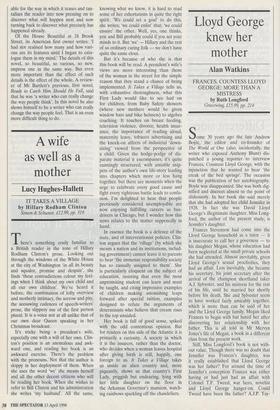A wife as well as a mother
Lucy Hughes-Hallett
IT TAKES A VILLAGE by Hillary Rodham Clinton Simon & Schuster, £12.99, pp. 319 There's something cosily familiar to a British reader in the tone of Hillary Rodham Clinton's prose. Looking out through the windows of the White House at the city of Washington 'in all its beauty and squalor, promise and despair', she finds 'these contradictions colour my feel- ings when I think about my own child and all our own children'. We've heard it before, the combination of lofty overview and motherly intimacy, the sorrow and pity, the seesawing cadences of speech-writers' prose, the slippery use of the first person plural. It is a voice not at all unlike that of our own dear Queen speaking in her Christmas broadcast.
It's tricky being a president's wife, especially one with a will of her own. Clin- ton's position is an anomalous and awk- ward one, and reading her book is an awkward exercise. There's the problem with the pronouns. Not that the author is sloppy in her deployment of them. When she uses the word 'we' she means herself and all the other decent citizens who will be reading her book. When she wishes to refer to Bill Clinton and his administration she writes 'my husband'. All the same, knowing what we know, it is hard to read some of her exhortations in quite the right spirit. `We could set a goal' to do this, she writes; `we could enlist' that; `we could ensure' the other. Well, yes, one thinks, you and Bill probably could if you set your minds to it. But 'we' — Hillary and the rest of us ordinary caring folk — we don't have quite the same clout.
But it's because of who she is that this book will be read. A president's wife's views are more interesting than those of the woman in the street for the simple reason that they stand a chance of being implemented. It Takes a Village tells us, with exhaustive thoroughness, what this First Lady would like to see laid on for children, from Baby Safety showers (where new mothers would be given window bars and bike helmets) to algebra coaching. It touches on breast feeding, television violence, divorce, health insur- ance, the importance of reading aloud, maternity leave, tobacco advertising and the knock-on affects of industrial 'down- sizing' viewed from the perspective of a child. Given the hodge-podge of dis- parate material it encompasses, it's quite cunningly structured, with amiable snip- pets of the author's own life-story leading into chapters which more or less hang together. but there are moments when the urge to celebrate every good cause and fight every righteous battle leads to confu- sion. I'm delighted to hear that people previously considered unemployable are now enjoying fulfilling careers as bus- drivers in Chicago, but I wonder how this news relates to the matter supposedly in hand.
In essence the book is a defence of the state, and of interventionist policies. Clin- ton argues that the 'village' (by which she means a nation and its institutions, includ- ing government) cannot leave it to parents to bear 'the immense responsibility society has so casually assigned to them'. She is particularly eloquent on the subject of education, insisting that even the most unpromising student can learn and must be taught, and citing impressive examples of children making astonishing leaps forward after special tuition, examples designed to refute the arguments of determinists who believe that cream rises to the top unaided.
Her book is full of good sense, spiked with the odd contentious opinion. But for readers on this side of the Atlantic it is primarily a curiosity. A society in which it is the insurers, rather than the doctor, who decides when a woman leaves hospital after giving birth is still, happily, one foreign to us. It Takes a Village takes us inside an alien country and, more piquantly, shows us that country's First Lady, priggish but endearing, lying with her little daughter on the floor in the Arkansas Governor's mansion, watch- ing rainbows sparkling off the chandeliers.


































































 Previous page
Previous page